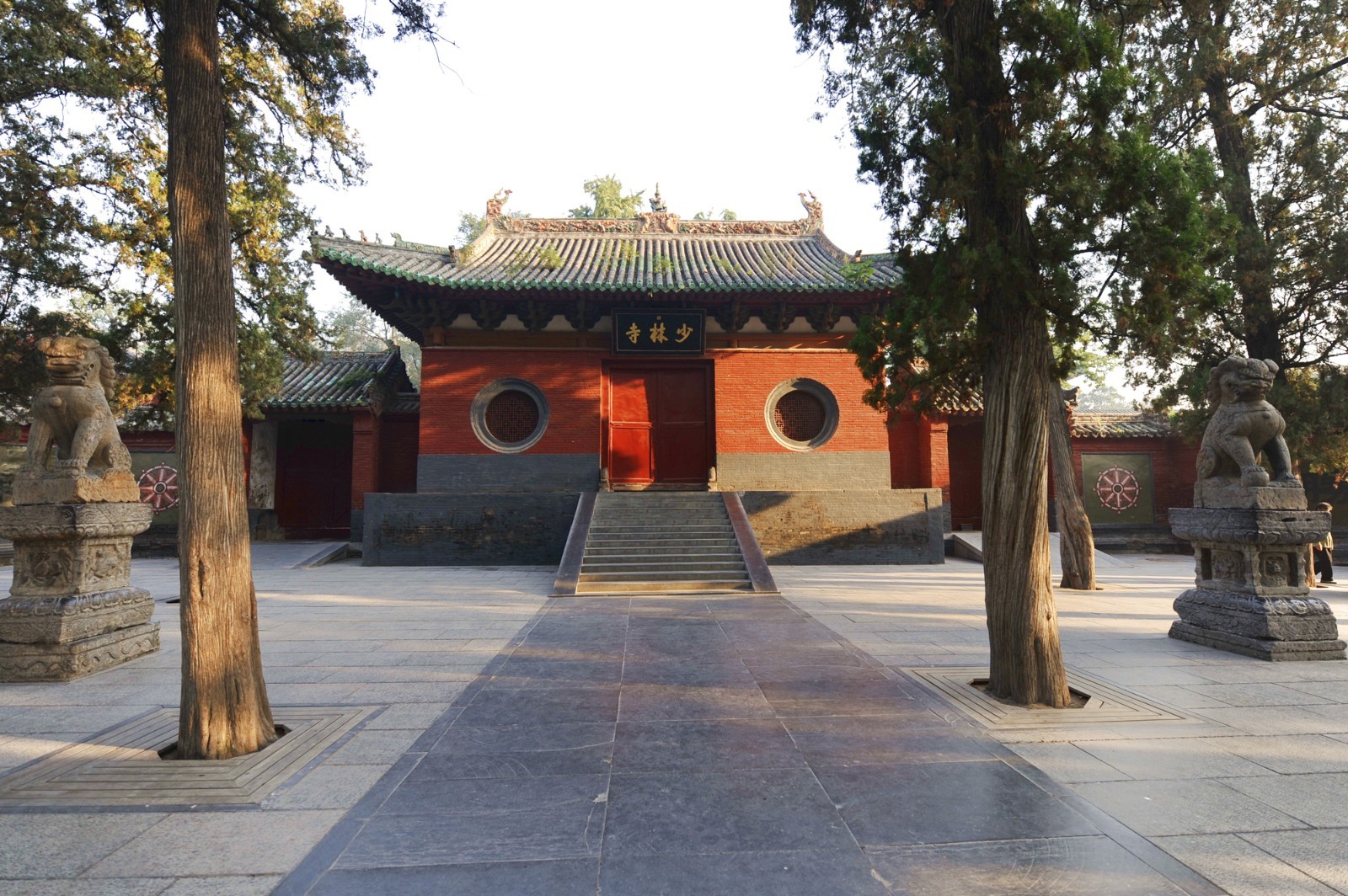Gateway
Gateway is the main entrance for Permanent Residence Compound, which consists of the front gate, the east and west side gates. It is the gable and hip foof architecture with three spans wide and two spans deep. It has a glazed-tile roof, with a front ridge carved dragon patterns, of which the ends are decorated with the dragon mouths and the central part with dragon head. All are elegant and colorful carved and glazed products. The bearing and supporting ridges are also colored and decorated with beast figures. These precious architectural components of the Qing Dynasty are now rare in Shaolin Temple. In the middle of the gateway hangs the horizontal inscribed board of “Shaolin Temple”, an emperor’ s handwriting in the 43rd years of Qing Kangxi (1704), which is in golden characters and black background. In the middle up carved is the privy seal of “written by Emperor Kangxi” . Gateway was renovated in the 13th year of Qing Yongzheng (1735) (originally with Devajara Hall as the Gateway). The open space is provided with a large door and secondary rooms with round windows, to show a harmonized effect of square and round simple and generous. The open space is built with the Buddha stand, with the Statue of sitting Maitreya placed in the front main niche and with wood-carved statues of Buddhist Protectors. On the east and west of Gateway is respectively a side door. It is a single-room rigid architecture, positioned on the low platform slightly higher than the open space ground. The slope is paved with bricks for carts and sedans.
Before the gate is vast front yard with the east and west scabblings, stone lions and flagstaff. The vast front yard is densely covered with a cedar forest making the old Shaolin Temple appear more mysterious and simple. One pair of 1.67-meter-high stone lions made in the Qing Dynasty, sitting on the 1.75-meter-high stone stone carving stands, showing a mighty spirit and having safeguarded the ancient Shaolin Temple over hundreds of years.

On the east and west of the open courtyard are two single-level scabblings, facing with each other to form the eastern and western symbols of the entrance area of the Gateway. The eastern scabbling was built in the 23rd year of Ming Jiajing (1544). The scabbling top is in the form of side halls, with carved front ridge and four horizontal ridges and tile ridges. Below the top eaves are four deformed square dougong, while the main one showing on the four sides the leaf rolls right up to the column top. The horizontal tablet, square columns, lower banisters and other components are in wood structure. The squared column is carved with the patterns like “Double Phoenix Ring to the Sun” and “Double Lion Playing Silk Balls”. The eastern board is inscribed with four characters of “Zu Chuan Di Ben” (Originator of Buddhism and Fundamental Truth” written by Zhongsong Shanzi. The columns are carved with couplets, with the first line being “On the ground and in the sky, number one of all the famous mountains” and second line being “Passing on teachings beyond words, the founder of all Buddhist schools”. The western board is inscribed with four characters “Ba Tuo Kai Chuang” (Founded by Batuo”. It was built in the 34th year of Ming Jiaxing (1555). On the east is inscribed “Mahayana Resort”, with the first line of couplet being “Passing on from the ancient cave, sitting to show the Buddha light in cold winter” and the second line of “Facing the wall to meditate, the wind brings sheng sound in the silent night”. On the west is inscribed “Chan Forest in Songshan”, with the first line of a couplet being “A couple of wells reflect of moonlight” and the second line of “A dozen of hills show green forest into the sky”.
On the south of the road to Gateway’ s open yard is the Shaoxi River, with a Shaoyang Bridge. Shaoyang Bridge was built in the 26th year of Qing Daoguang (1846), with a stone structure. It is 5.55 meters high, 37.75 meters long and 5.73 meters wide. The western end of the bridge was carved with a dragon head (also called as water-sucking beast), while the eastern end with the dragon tail. Before Shaoyang Bridge was built, two other bridges had been built destroyed in the flood.
